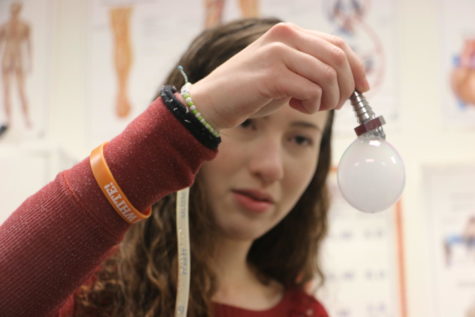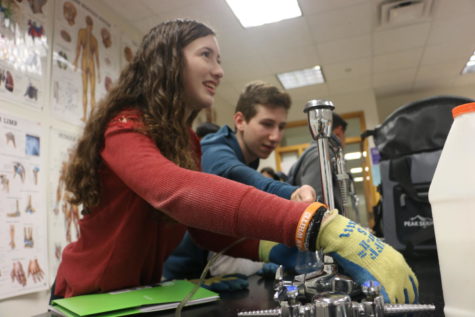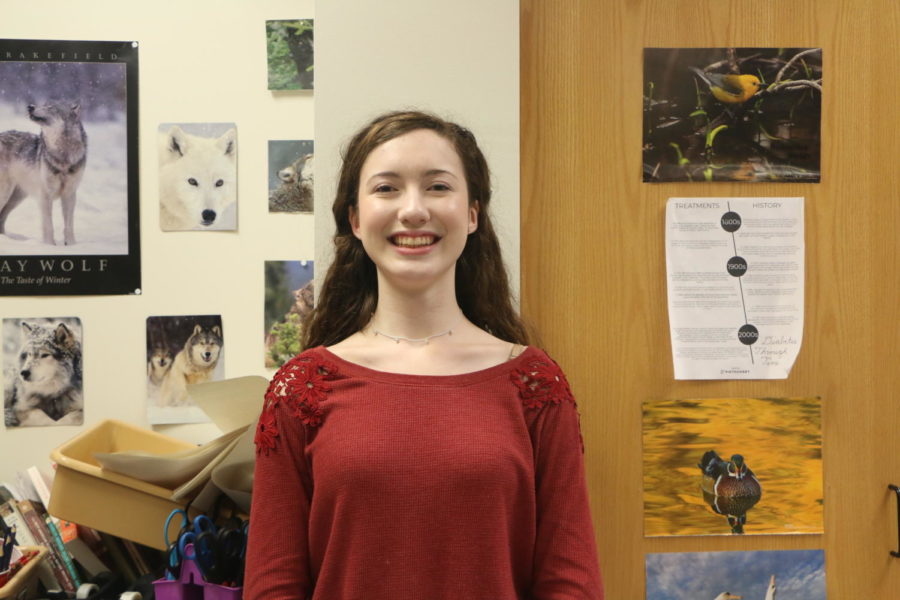Junior Olivia White

Can you describe your involvement in STEM?
I’ve been in STEM classes since my freshman year, so I’ve been in the required ones—honors biology, honors chemistry—and then I also took part in the Project Lead The Way courses… Something I really loved about all of the PLTW courses is, they had a lot of emphasis on the different careers in science, which I think is something that we miss a lot of in our required science curriculums.
A lot of times, students who could have been really amazing science students don’t end up taking that route in college and beyond because they just don’t know about all the options for them. That’s kind of the reason we’re seeing this, in the United States; there’s so many science careers that are going unfilled. I think that’s one of the issues: we’re not doing enough to teach kids about the different opportunities available to them in the science field.
What STEM clubs and organizations are you involved in?
My freshman year, I was in Chemistry Club, which I’m still in. That is a club based on chemistry. One of the main things we do in that club is, we travel to different elementary schools and we would put on chemistry-specific demonstrations. They’re not super often; it was maybe three (times) a year, but it was really fun.
That inspired me to actually start my own club my sophomore year called Science National Honor Society (SNHS). It revolved around the similar thing of outreach in science and reaching out to younger students and trying to get them involved in science, but it was more based on all of science and not just chemistry. It was application-based because it’s part of a national organization called Science National Honor Society, and it’s essentially to recognize excellence in the science field and to encourage (members) to use their passion and their excellence in science to better our community.
A lot of the things we do involve putting on science demonstrations at elementary schools or middle schools. We’ve judged a couple of science fairs; we’ve helped out at some high school events. So yeah, that’s kind of what that organization is about; I started out my sophomore year and I plan to continue that.
Then, freshman year, I also was involved in Science Olympiad, which is a competition based science club… Both my freshman and sophomore years, we were lucky enough to win our state tournament and get to compete on the national level. That was super cool for me to get to be involved in an organization like that, full of students who are super passionate about science, and then to get to go compete with that on a national level and just see even more excellence in the sciences. That was just a really cool experience and (I was able to) meet a lot of cool people who had similar interests as me.
What drew you to STEM?
My interest is science probably started in middle school. My mother is a chemist. I mean, she never pushed me to be interested in her career. She always let me explore my interests, but she, as a chemist, would do these volunteer events at the Children’s Museum. I would go to those, and I would see her and some of her colleagues, and how engaged they would be with the young kids, and all the experiments they would do with them trying to just kind of up that youth involvement in STEM. I always thought that that was super cool and it was really interesting to me. Not only did I see that and think, “Well, I want to go into STEM,” but I also saw that and thought, “Even as a student, I can be someone who helps cultivate passion in students in science.” If my mom can do it and all these people are placing so much emphasis on science, then I should be able to do the same.
All throughout middle school, science classes were my favorite classes, and going into high school, I knew I wanted to take as many science classes as I could, join as many science clubs as I could. Once I got to high school, just seeing all these students who took their passions and ran with them, I thought, “Well, I can do the same thing.” So that’s what I did with SNHS. That’s what I did with being a leader in science Olympiad. I took what I was really passionate about and I built a leadership role out of it.

How has STEM impacted your identity?
I think I would label myself as the “science girl.” I really value science, and in almost all of my extracurriculars that I do, even the ones that aren’t strictly science-based, I’ve labeled myself as a science person.
I’m part of CMYC (Carmel Mayor’s Youth Council), and we do events around the city. I went into that labeling myself as someone who is really passionate about science, and I came out of that being the chair of my own science event—a city-wide science event for elementary school students. Everything I do connects back to my passion towards science and that passion towards sharing science, too.
I think there’s a lot of students at Carmel High School who really love science, and I think that’s something that is really cool about Carmel High School too. There’s so many people that you can find a lot of people who are passionate about the same things you’re passionate about.
By starting SNHS, and by being part of Chem(istry) Club, I’m able to find other people who are not only passionate about learning, but passionate about sharing as well. I think that’s really important to helping me feel better because I don’t have a whole lot of time to volunteer. But when I can volunteer and when I can volunteer on something that I really enjoy, it makes me feel better as a person.
Could you explain the CMYC science event in further detail?
(Last year) was the first year of that event, and we held it at the high school. We ran a bunch of experiments and a couple of workshops as well, and we invited students from all over the city…
We also had some other clubs from Carmel High School come. Chem(istry) Club came and they did a demonstration. We actually had TechHOUNDS bring their robot which was super fun. The robot they had built that year was a robot that shot a basketball into a hoop, which was really cool, and the kids really liked to see that.
I think, like I’ve talked about earlier, some of our required STEM curricula really are lacking in that they don’t get students passionate about science. They just kind of give them some coursework and say, “Here you go.” It really takes a lot of kids taking that extra step outside of school in order to get passionate about science.
I think (it’s important) having events like this for young kids to get exposed to really cool things you can do with science early, and get exposed to other students who are passionate about science really early, so that as they’re coming up through middle school and coming up through high school, they can have this idea in the back of their head that science doesn’t have to be taking notes out of a book or stuff like that. Science can be fun, and there’s a lot of kids like them who also like science. That’s what I was trying to do there.
What sparked your interest in STEM?
What I love about science is the fact that it can be so hands-on. I feel like in middle school, you miss a lot of that because a lot of what you’re doing in those classes is taking notes out of a book and getting lectured at about cell biology. I first found my passion (when) I had a family member who was tested for a genetic disorder and came back positive. I was pretty young—barely really knew what DNA was—but I was upset over the news, obviously.
I went home and I said, “I want to find out what this is. I want to know what this is.” I did as much research as I could. I mean, I was young, I didn’t really understand a whole lot of science, but doing that research for myself—and not having a teacher come over and say, “You have to learn about this disease, and you have to try to learn this aspect of cell biology” and getting to do that for myself and to try to figure out what was going on with this disorder—was the first time that I was like, “Oh, science isn’t just this thing that people are going to teach you your whole life and then finish with ‘Alright, that’s what science is.’”
There’s pieces of science that are undiscovered. That was the first time that I figured out that, like, “Oh, scientists don’t know everything. There’s still stuff to be discovered. There’s still so much that needs to be done in the scientific world.” That was the first time that I had thought about science like that.
From there, that’s when I knew that I wanted to be someone who was continuing to add pieces to the puzzle that is science. That’s how I knew that (science is) what I wanted to do with my life and that’s what I wanted to do with my career.
Through that, I found ways to make science as interesting as I could for myself. Going to those demonstrations with my mom and seeing, not just reading out of a book, but seeing my mom do all these experiments with corn DNA and strawberry DNA—isolating that DNA. Getting to see like, “This stuff. This is what DNA is; this is what I tried to teach myself.”
I mean, I probably failed miserably, but this is what I tried to learn on my own and here’s the physical proof of what this is. That was really cool to me. Doing Chem(istry) Club and showing kids like, “It’s not just a book; it’s not just what your teachers tell you. Look, we’re doing it right here,” getting to do things like that is really cool.
How do you plan to pursue STEM further?
I plan on majoring in molecular biology, but as far as further than that, I probably want to get a PhD in the area and then go to work. I haven’t decided what I want to do after college yet because that’s a big scary thing. But I interned at Lilly over the summer. It was really interesting because I interned in one lab, but I had a lot of lab meetings and got to talking to a lot of people, so I got to see kind of what different levels of education can get you career-wise.
The main person that I worked with, his name was Matt. He had a master’s degree and he had worked in academia for maybe three or four years at Ohio State. He talked about how working in academia is cool because it’s pretty self directed…
I also got to see my PI (Principal Investigator). He was a PhD and he was not as much hands-on work, so he wasn’t as much, running the gels and doing the actual experiments. But he was synthesizing all of the experiments… He was more bigger picture.
I’m not really sure, currently, whether I want to go into academia or industry, or what I want to do there. But like I said, I do have a passion for sharing science. I think being a professor will also be something very interesting to me—like teaching and meeting with other passionate people in a similar field. I’ve got a lot of options. I haven’t really decided, but I probably want to major in molecular biology and then see what happens from there.
What are your thoughts on female underrepresentation in the STEM field overall?
I make it a point to always research a lot of really important female scientists. One of my idols as a kid in eighth grade was Jennifer Doudna. She and Emmanuelle Charpentier pioneered CRISPR, that whole discovery, which has taken the biotechnology field by storm. It’s insane what has happened with that technology in just a couple of years since it’s been out. I think it’s stressful when you’re wanting to go into colleges and you know that the fields that you want to go into are male-dominated because for so long, that’s just been the way it is.
I think we’re starting to get to where we do see these powerful women in STEM. Jennifer Doudna is probably going to win a Nobel prize, and it’s amazing work that she and another woman did.
Seeing those idols like Mary-Claire King who discovered the RCA gene—those people are not only phenomenal scientists, but they have both added aspects to their career of public outreach, which I think is super important. You see Jennifer Doudna opening up these conferences for talking about gene editing and opening up to the public and trying to bridge that gap between scientists and the public and saying, “Hey, (CRISPR) is going to be a huge thing. We want everyone’s ethical considerations on this. We don’t want it to just be the scientists deciding what’s okay and what’s not. We want it to be a conversation.”
I think for a lot of young girls who are interested in science, we can look up and we can see people like that. And that’s super important.
Now I know for them, it was probably super hard to get into that field, but now we see those people and it gives me hope to see that.
Like there’s always women winning Nobel prizes, and we’ve gone from having Rosalind Franklin who got cheated out of that Nobel prize with Crick and Watson to (now), (where) we see Jennifer Doudna and Emmanuelle Charpentier (who) are the two sole discoverers of CRISPR.
That’s super cool to me, to be able to say, “I’m going to see her get a Nobel prize.” That’s super exciting to me.
I mean, I think there’s difficulties (for women in STEM fields) obviously. When we learn about scientists in our science classes and we just constantly keep hearing all these male names, it gets boring. But with just how much is happening in the field and how much of that is female-led, I think, we’re definitely moving in the right direction.
What do you think has allowed for the increase of women in STEM fields?
I think, as a whole, the scientific community in the education field is doing a lot to try to focus on those women and those minorities who might not otherwise have the opportunities that men have in the field. I think expanding those opportunities for women has been extremely important.
I’m currently doing an AP research project on exploring factors that get students involved in STEM. A lot of these studies are talking about gender disparities and that men are just so much more encouraged to go into science and math fields.
There’s always been this myth, “Oh, boys are better at math than girls.” It’s damaging to young girls to say, “Well, you’ll never be as good as this other guy.” There was recently a study that finally came out that disproved this and said, “This is completely false.” They did an actual scientific study and disproved that complete myth. So, I think we’re moving in the direction of encouraging women specifically and encouraging minorities specifically. Not to say that we’re leaving men out, but also they’ve been running the world for long enough.
Do you have any advice for girls who want to pursue STEM?
Research women in STEM. It’s so cool to learn about these women who have done these amazing things in science, the awards they’ve been recognized for, and all of the coolest things that they’ve gotten to do and are still doing today. That was super empowering to me. Definitely research women in STEM. That’s super cool.
Do as much research as you can about opportunities outside of school because if you’re wanting to get into science, it’s not just about paying attention in school. School is not going to be the most hands-on experience for you. It’s not going to teach you how to do research and how to come up with your own scientific questions. Get out there. There’s tons of scientific opportunities you can partake in over the summer. There’s Project STEM, there’s SSP (Summer Science Program), there’s a bunch of things at colleges and universities all around the United States that want to have women come and learn about science. There’s a ton of opportunities. Just do your research and put yourself out there. If you want to pursue STEM, and if you’re passionate about STEM, you can. It’s easier now than it probably has been for a really long time. Get out there, do the research you can, and do what you’re passionate about.










